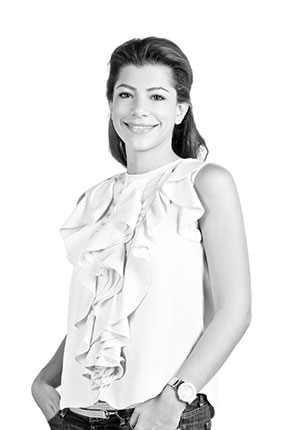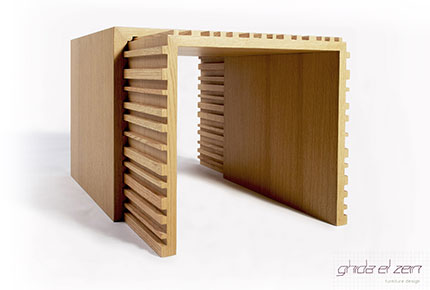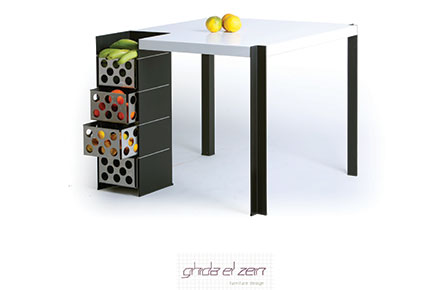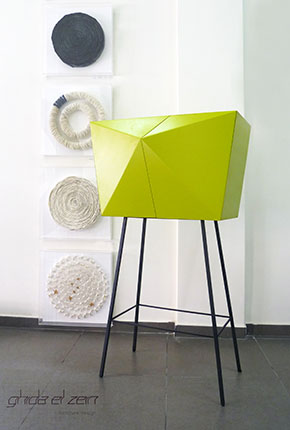Design within reach
Furniture designer and LAU instructor Ghida el Zein talks to MarCom about her experience and some of the challenges young designers might encounter today in Lebanon.

Ghida el Zein opened her own studio Blank Space in 2009 and, with a passion for local talent, embarked on a mission to “experiment, reinvent, manufacture and iterate.”
Having been privy to the knowhow of top European architects, designers and innovators, alumna Ghida el Zein, furniture designer and LAU instructor, gives an insight into life as a designer in Beirut.
How did you come to teach at LAU?
Ghida el Zein: It just happened naturally, I started teaching a design workshop at LAU in 2009 and I liked it. Later that same year they asked me to give an Interior Design and Architecture Studio course and it was really inspiring to work with young students. I have been a part time faculty ever since, focusing on the studio work where students develop one interior design project during the semester. The process and evolution of the assignment from conception to completion is always a beautiful and exciting story.
After graduating from LAU’s School of Architecture and Design you went to Milan’s Domus Academy for your Masters in Furniture and Product Design. Milan itself is an international design center. How much did that environment help to push you forward?
Ghida el Zein:Going to Milan I discovered a whole new world of design that just didn’t exist in Lebanon. Now it’s booming here, but in 2005 there were only a few designers exploring the furniture industry. In Milan every week there was a new design exhibition or competition; it was very motivating. Being in the world design capital inspired me to take part in these competitions and helped me obtain first and fourth prize in two of them. Also, at Domus, I also had the opportunity to work on projects with famous designers like Guido Venturini and Marc Sadler. You could sit with them once a week and pick their brains. That in itself helped push me forward.
What were the biggest challenges to setting up your own studio, Blank Space?
Ghida el Zein: Well, like a lot of start-ups, it is always a challenge. Not meeting people’s expectations is a risk you take. I established the studio in 2010 and launched my first exhibition at the end of that year. It was a great success and we sold out in three days. That certainly put my fears to rest. From there on we started growing as a studio and developed both a collection line and custom design projects.
Is the production process a challenge in Lebanon?
Ghida el Zein: It’s a challenge because of lack of new materials availability and innovative production machinery. Also our production uses artisanal work; it’s not mass produced by machine, but by man. The humanistic approach gives the process more emotion, meaning more unforeseeable surprises. In a way it is what is beautiful about that challenge, with each individual product comes a story.
Is it an exciting time to be a designer in Beirut?
Ghida el Zein: It is. Design is booming, the furniture industry is creatively at its peak. It is very exciting producing new collections, trying to work with new materials, discovering innovative production methods and meeting today’s client’s needs. It’s maybe a little tougher these days with the economic crisis Lebanon’s going through. I have good relationships with interior architects and designers so I have a constant flow. On the other hand, maybe this crisis could be an inspiration to create a line that’s more affordable, to have design within reach, something to think about for our next collection!
www.ghidaelzein.com
More
Latest Stories
- Into the Psychology of Justice
- Alumnus Zak Kassas on Navigation, Spoofing and the Future of GPS
- Hearing Between the Lines
- LAU Hematology Conference 2025: Advancing Science Through Interdisciplinary Exchange
- Dr. Chaouki T. Abdallah Invested as LAU’s 10th President
- LAU Guides Its Students Through the Code of Conduct
- Innovative Procedure at LAU Medical Center–Rizk Hospital Signals Hope for a Patient With a Congenital Disease
- LAU’s Inaugural PodChat Session Addresses AI Detection in the Classroom




